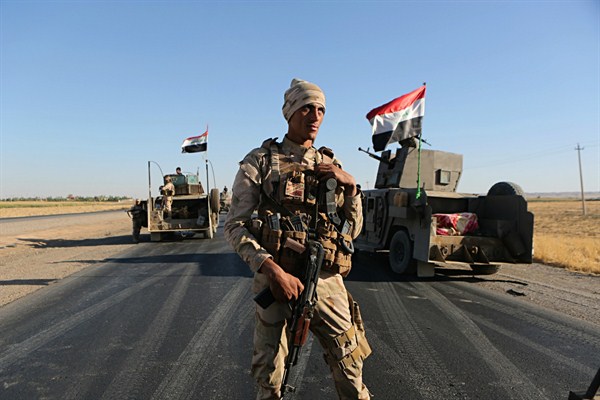Events in Iraq this week will go down as one of the greatest debacles in the living memory of many Iraqi Kurds. On Monday, the confrontation between the autonomous Kurdistan Regional Government of President Masoud Barzani and Iraq’s central government escalated dramatically when Baghdad launched a major military offensive to retake the multiethnic, oil-rich city of Kirkuk. Kurdish forces had seized control of the city in 2014 in the vacuum created by the advance of the self-proclaimed Islamic State and the retreat of Iraqi troops. Less than 15 hours after the start of the Kirkuk offensive, a coalition of regular Iraqi armed forces and Shiite militias backed by Iran were reported to be in full control of most of the city, its airport, main military bases and several large oil fields.
The ease with which Baghdad was able to reconquer Kirkuk, with hardly any resistance put up by Kurdish forces, known as the peshmerga, came as a profound surprise to international observers. Yet the Iraqi Kurdish withdrawal did not stop there. By Tuesday afternoon, northern Iraq’s Kurdistan region had lost vast territories, some of which the KRG had controlled since the fall of Saddam Hussein in 2003. This week is certain to be remembered as a watershed moment when intra-Iraqi power dynamics shifted decisively from Irbil to Baghdad.
It comes just weeks after Iraqi Kurds held a nonbinding unilateral referendum on their independence, despite widespread international opposition and vows from the Iraqi government to prevent the breakup of the country by force, if necessary. Most controversially, though, the referendum on Sept. 25, which was approved by 92 percent of voters, was also held in northern Iraq’s so-called contested territories—areas with a sizeable Kurdish population, yet outside the nominal jurisdiction of the KRG. The Kurds have occupied these areas since 2014, when the Iraqi army abandoned them in the face of the Islamic State. Most prominently among them is Kirkuk, venerated in Kurdish lore as the “Kurdish Jerusalem.”

